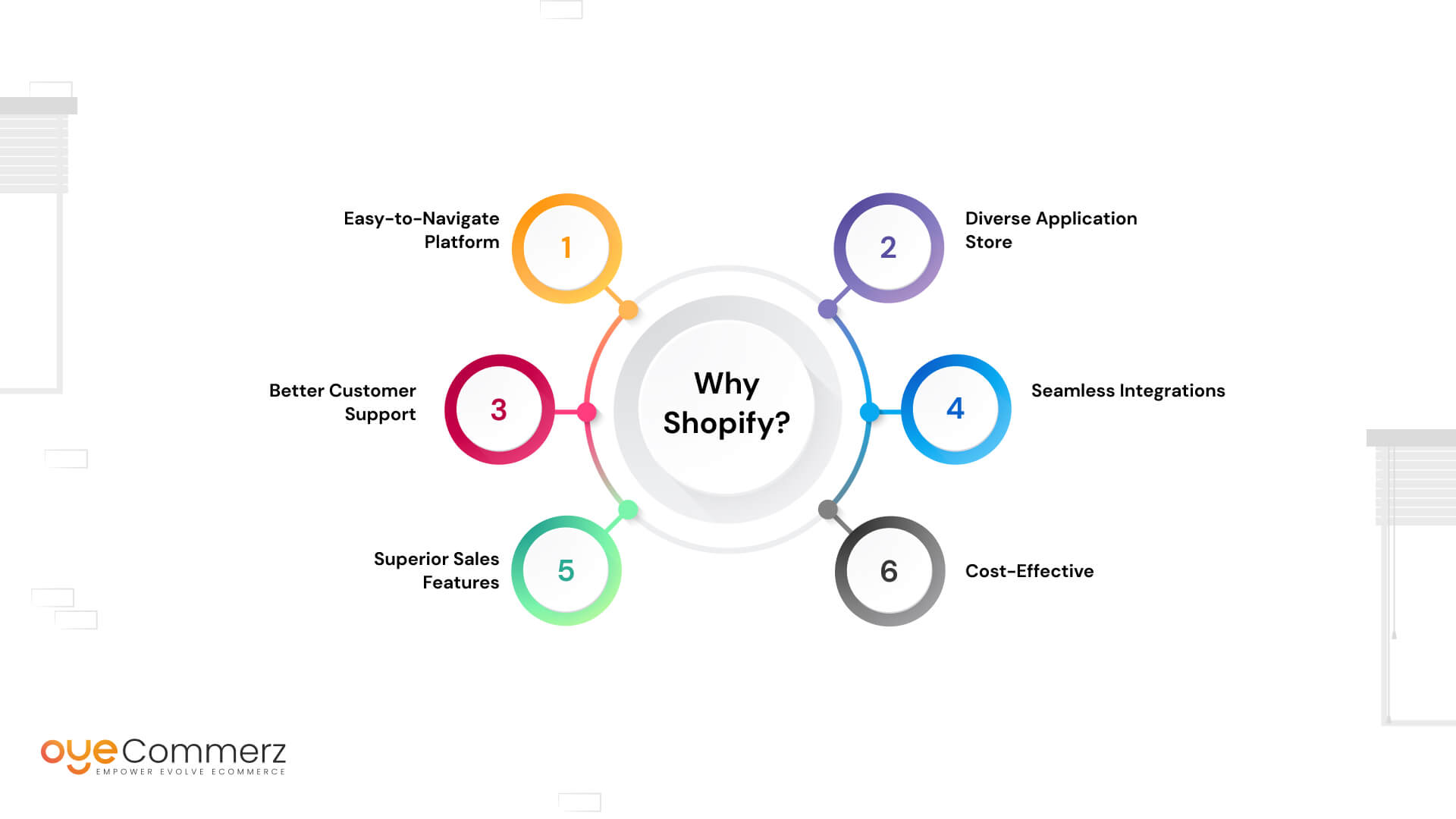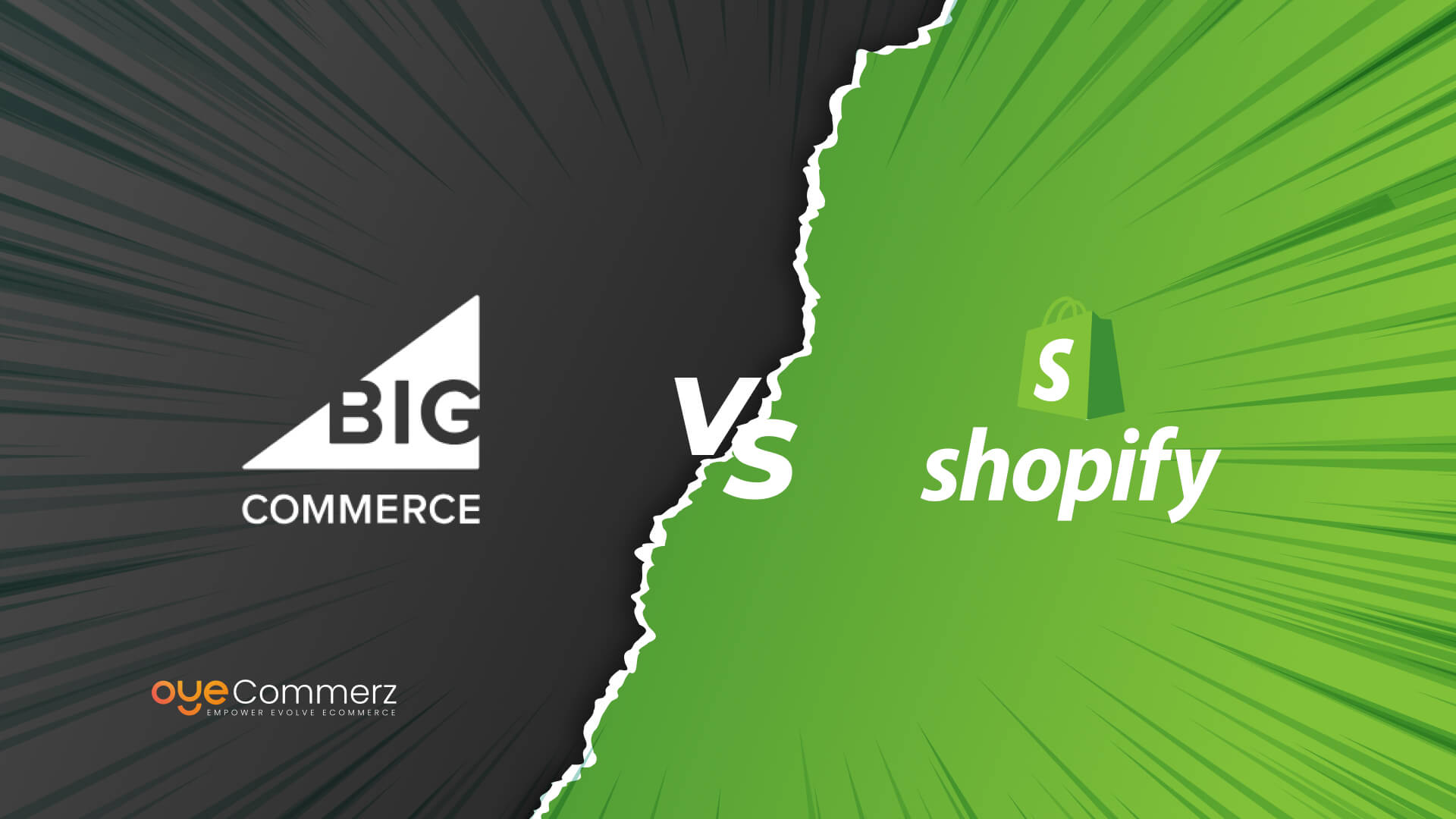Ever wondered if you’re really using the best platform for your growing online store? If you’re an existing Shopify business owner and thinking about scaling up, it’s only natural to compare what’s out there—especially when platforms like BigCommerce are making noise.
Here’s the kicker: businesses that choose the right e-commerce platform from the start see up to 30% faster growth in their first two years.
In this blog, we’ll break down Shopify’s features vs. BigCommerce’s features in a friendly, side-by-side way—no tech jargon, no fluff. Whether you’re running custom themes or exploring app development to power up your store, this guide will help you see which platform actually fits your long-term vision. Let’s dive in, one feature at a time.
Table of Contents
ToggleDifference between BigCommerce and Shopify
BigCommerce and Shopify are both among the leading e-commerce platforms with their advantages and disadvantages. BigCommerce is loved for its great deal of out-of-the-box functionality and somewhat higher pricing plans, which can be a strong advantage for businesses that don’t need to use numerous apps as extensions. However, this can also make the interface of BigCommerce too cluttered, and not so friendly for those using it for the first time.
On the other hand, Shopify stands out for simplicity by using the drag-and-drop editor that even a beginner will find easy to use. Shopify has 6,000+ apps that can be easily integrated through the app store, making it simpler to tailor to the needs of the business. Also, Shopify is relatively cheaper and more affordable to SMBs than Magento, especially since it does not need as much customizing and integrates smoothly with other applications. While both platforms have great SEO and marketing capabilities, Shopify has better customer support service and built-in POS, which make it the more suitable option for many e-commerce business owners.
Impressive Stats of Shopify
- Shopify has over 2.1 million daily users according to Fundera.
- Demand Sage states that Shopify hosts over 4.8 million websites across 175 countries as of January 2024.
- According to Demand Sage, the majority of Shopify stores, totaling 2,907,545, are based in the United States.
- Search Logistics notes that 79% of all Shopify traffic originates from mobile devices, highlighting Shopify’s strong mobile user experience among e-commerce platforms worldwide.
- eDesk reports that over half of Shopify stores experience repeat purchases.
Shopify vs BigCommerce: Comparison of Features
It is critical to compare the services provided by Shopify and BigCommerce based on the features that can matter to your business. Below is a detailed comparison:
1. Storefront Design and Themes
- Shopify: It offers more than 70 professional web design themes, some of which are paid for while others are open for use. These are easy to customize and mobile-friendly.
- BigCommerce: Currently, there are about 100 themes, but not all are open source. Customization depends on the technical capacity more than standardization.
2. Product Management
- Shopify: The advantages for the seller include: simplicity of product additions, easy inventory tracking, and products that can be easily digital.
- BigCommerce: Several tools are provided for managing options and bulk prices, but they require fine-tuning and can be very confusing at times.
3. Sales Features
- Shopify: Abandoned cart email sequence, MLM on social media, Amazon, and eBay, implement POS system.
- BigCommerce: Both have comparable multiple-channel selling but VTEX does not have a native Point of Sale.
4. Customer Support
- Shopify: Phone, email, and live customer support, available up and until each day of the week, from morning until night. Extensive online resources.
- BigCommerce: Availble all year round but some clients have complained of slow response.
5. Apps and Integrations
- Shopify: More than 6,000 applications in the Store of Shopify. Easy integration with other applications.
- BigCommerce: There are fewer of them that are available and the integration can also be a problem at times.
6. SEO and Marketing Tools
- Shopify: Easy-to-use marketing tools, excellent SEO tools, and compatibility with social media networks making it a great tool for coming up with traffic and sales.
- BigCommerce: It also contains fine SEO tools but some of its marketing tools are not very easy to use compared to Shopify.
7. Payment Gateways
- Shopify: Integrated with over a hundred payment gateways including Shopify Payments which do not charge the users for the transactions.
- BigCommerce: This can be integrated with fewer payment gateways, and this service attracts an extra charge if not using the company’s recommended payment processor.
8. Pricing
- Shopify: Provides three main packages which are the basic plan, the Shopify, and the advanced plan to meet different business requirements. Other costs may also include app costs and transaction costs.
- BigCommerce: This comes with a slightly higher price, with four categories; Standard, Plus, Pro, and Enterprise. BigCommerce comes with more integrated tools which may essentially minimize the use of specific applications.
9. Mobile Optimization
- Shopify: All themes are mobile-friendly to allow for ease when shopping via mobile phone or other mobile devices.
- BigCommerce: Most themes support mobile but some older themes do not have mobile support.
10. Security
- Shopify: Offers SSL certificates on all the plans and complies with PCI standards hence protecting the customer’s data.
- BigCommerce: But it does offer SSL certificates and is PCI compliant and some security features may be additional to set up.
11. Scalability
- Shopify: Extremely flexible and versatile so it can work for small start-ups, medium-sized businesses, and even large corporations alike.
- BigCommerce: It is also scalable, but users may consider that the platform lacks some flexibility in terms of further development of the business.
12. Internationalization
- Shopify: Built with multiple languages and currencies to cope with the requirements of the worldwide market.
- BigCommerce: It supports multiple currencies but has comparatively fewer options in terms of language as compared to Shopify.
Shopify vs. BigCommerce Comparison
| Feature | Shopify | BigCommerce |
|---|---|---|
| Ease of Use | User-friendly, intuitive | More complex, steeper learning curve |
| Customization | Wide range of themes and apps | Limited themes, requires technical knowledge |
| Pricing | Lower starting costs | Higher starting costs |
| Payment Gateways | 100+ gateways, Shopify Payments | Fewer gateways, transaction fees |
| SEO and Marketing | Strong SEO, easy marketing tools | Robust SEO, less intuitive marketing |
| Storefront Design | 70+ professional themes | 100 themes, fewer free options |
| Product Management | Easy setup and management | Advanced options, complex management |
| Sales Features | Abandoned cart recovery, multi-channel | Multi-channel, no native POS |
| Customer Support | 24/7 support, extensive resources | 24/7 support, slower response |
| Apps and Integrations | 6,000+ apps, seamless integration | Fewer apps, challenging integration |
Why Shopify is a Better Choice than BigCommerce

1. Easy-to-Navigate Platform
Shopify has put much effort into developing a platform that is easy for users to navigate. It has a drag-and-drop builder, toolbars that are well-navigated, and a great number of tutorials which make it rather simple to design and start an online shopping business. On the other hand, the interface of BigCommerce is not very friendly and the platform has a kind of complex setup for a beginner.
2. Diverse Application Store
Shopify has a rich application store that comprises over 6,000 apps. This makes it possible for a business to incorporate some functions like email marketing, customer reviews, and powerful analytics, among others without any patch of programming knowledge. BigCommerce, although it has a good number of apps, is poorly compared to it in terms of restricting customizations.
3. Better Customer Support
Shopify supports its customers every time of the day and through various methods such as phone, email as well as live chat. The support team of this program is much appreciated due to the fast and useful answers given to them. BigCommerce has similar customer service, offering 24/7 support while users may experience longer wait times and unsatisfactory outcomes.
4. Seamless Integrations
Shopify supports smooth cooperation with numerous third-party tools and services. When it comes to third-party apps you will need for accounting, customer relation management, or social media marketing, everything is integrated seamlessly with Shopify. Despite applying considerable effectiveness, BigCommerce comes with integrations that need extra effort while creating and sustaining the connections.
5. Superior Sales Features
The capabilities of engaging tools like Abandoned Cart Rescue, Multi-Channel, and a native POS system of Shopify assist sellers in selling and processing transactions. BigCommerce also has similar functionalities but it does not have an in-built POS system which could be an issue to the store owners with physical stores.
6. Cost-Effective
While there can be extra expenses with the use of apps and transaction fees, most of the time Shopify has a better deal especially for small to medium-business companies. Shopify is more financially viable in that the start-up costs are low and one isn’t locked into a plan they need to scale once the business begins booming.
Boost Your E-Commerce Store Sales and Potential with OyeCommerz!
Make the move to Shopify for advanced SEO tools, faster page loading times, extensive app integrations, and superior multi-channel sales capabilities. Benefit from Shopify’s user-friendly interface, enhanced customization options, and comprehensive analytics to elevate your store’s performance.
Trust OyeCommerz for expert BigCommerce to Shopify migrations. Our precision, speed, and in-depth platform knowledge ensure a seamless transition, positioning your store for immediate and long-term growth. Get in touch with us today!
Contact to Migrate your Site to Shopify Now
Conclusion
Deciding on the appropriate e-commerce platform is a very significant factor taken into consideration in every business. Shopify is easier to use, has more apps, better support, better integration as well as cheaper than BigCommerce. Our services cater to any company that is seeking to transfer from BigCommerce to Shopify, and this way, we help you get value from Shopify. Contact us, and let our team take advantage of our knowledge to assist you in opening up new ways of expanding your business within the e-commerce market. In case you’re thinking of making a BigCommerce to Shopify switch, please don’t wait to get in touch, and let us show you how you can evolve your online store and grow beyond your business.
Frequently Asked Questions
Shopify is generally better for beginners due to its intuitive dashboard, easy setup, and user-friendly design interface. BigCommerce offers more built-in features, but its learning curve is slightly higher for non-technical users.
Shopify focuses on simplicity with an extensive app marketplace, while BigCommerce offers more advanced features out of the box like native B2B tools and multi-channel selling without apps. However, Shopify allows more customization through third-party apps and app development.
Both platforms offer strong SEO features, but BigCommerce gives more control over URL structures and metadata. Shopify excels in ease of use and app integrations to enhance SEO, making it easier for small teams or solo store owners to optimize.
Shopify is ideal for fast-growing brands thanks to its ecosystem of apps, global infrastructure, and scalability. BigCommerce supports enterprise-level growth with built-in functionality, but Shopify’s flexibility gives it an edge when paired with custom app development.
Shopify offers Shopify Payments, which eliminates transaction fees, and supports 100+ gateways. BigCommerce also supports multiple gateways but may charge additional fees depending on the provider. Both support modern options like digital wallets and BNPL.


